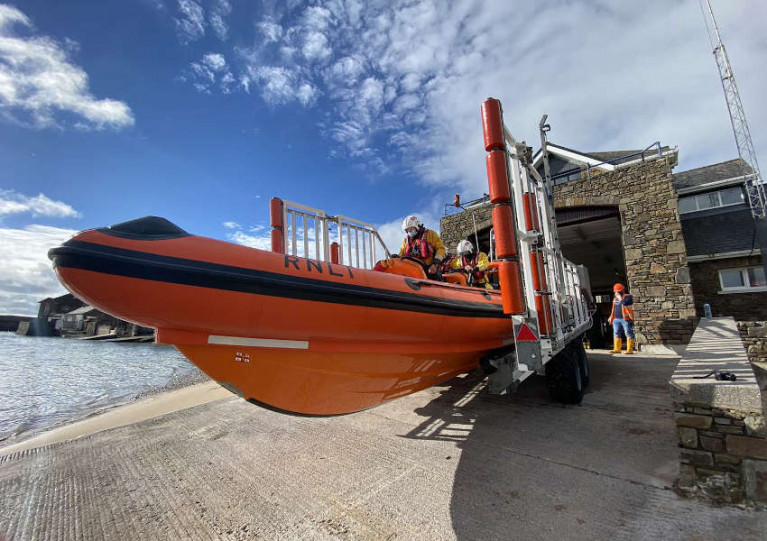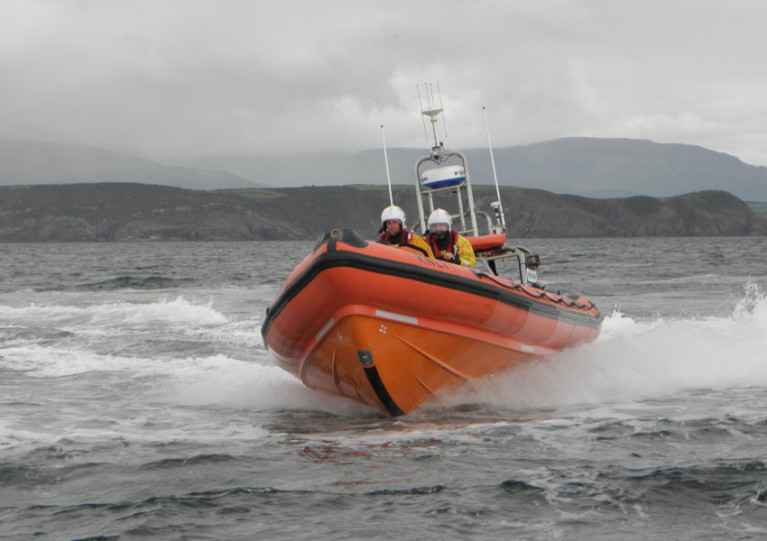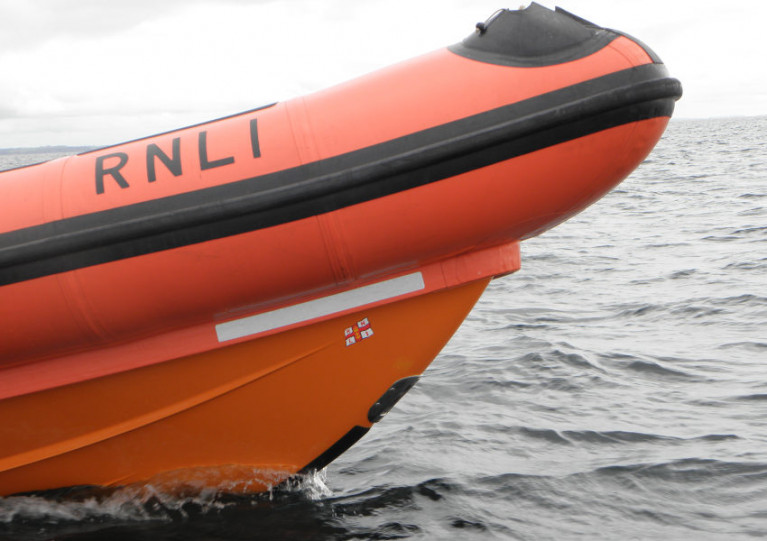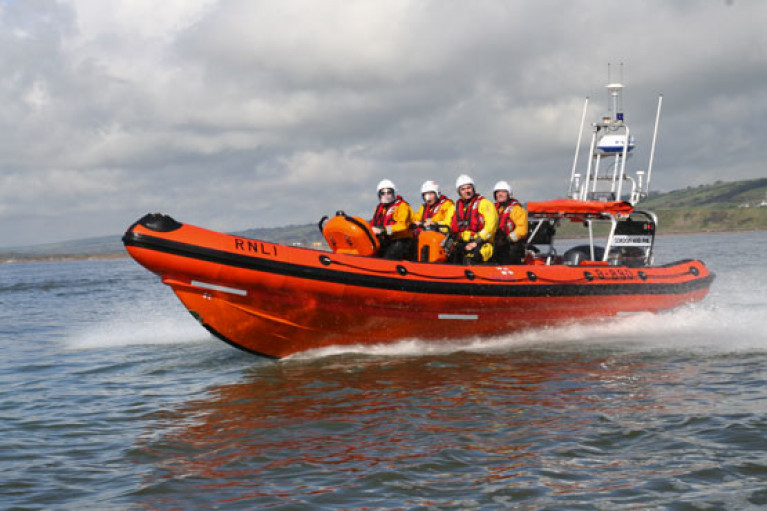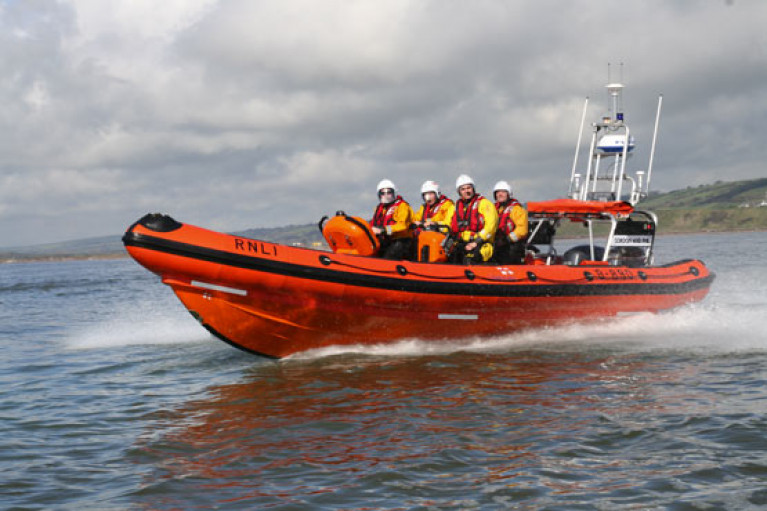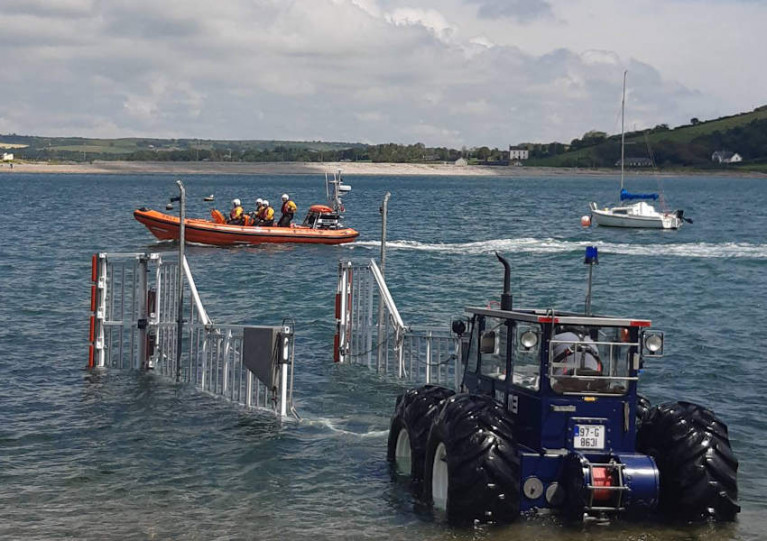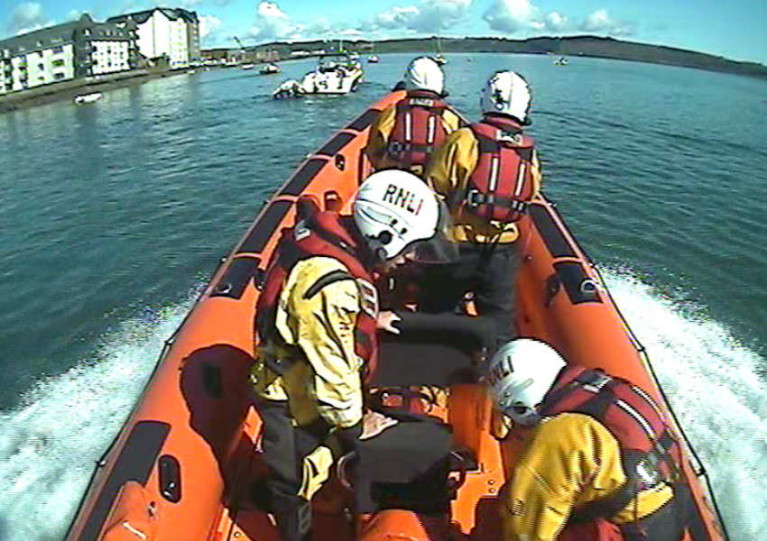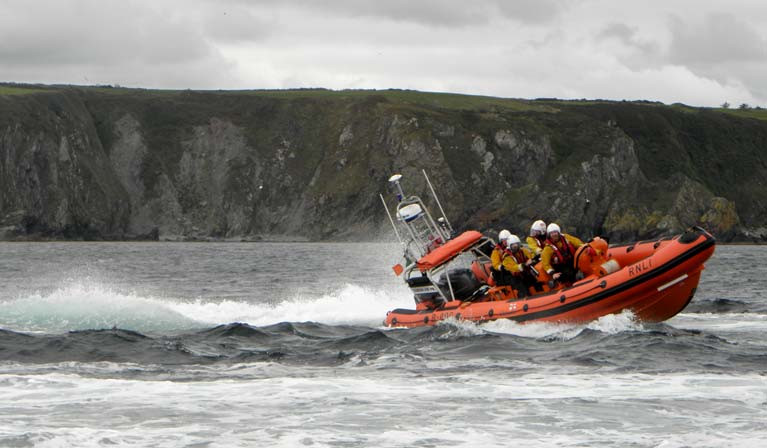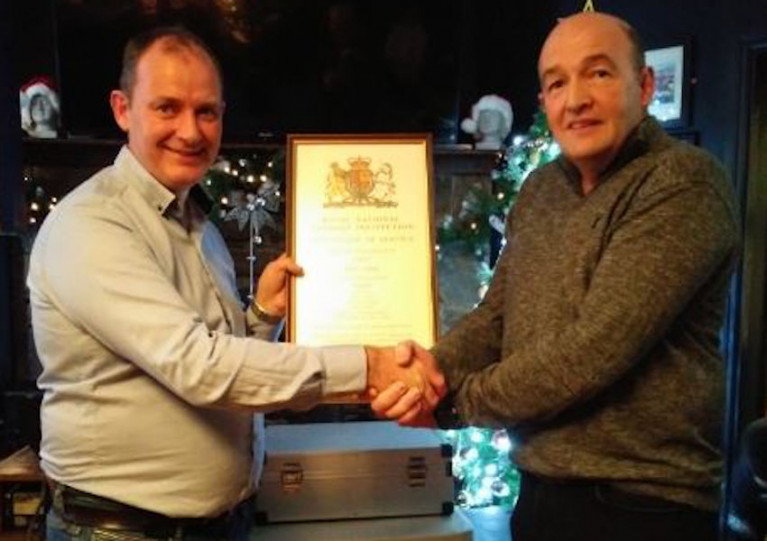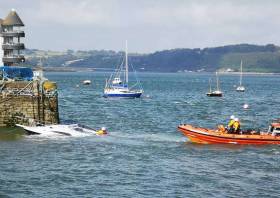Displaying items by tag: youghal
Swimmer Dies After Getting Into Difficulty Near Youghal
A man has died after getting into difficulty while swimming of the cast near Youghal last Friday (18 September).
Youghal RNLI was called to the scene at Caliso Bay in Co Waterford on Friday afternoon after the man was reported missing to the coastguard.
A lifeboat crew member quickly spotted the casualty in the water and he was brought on board. Volunteers started CPR while the lifeboat returned to station.
CPR continued in the boathouse until paramedics arrived. However, the man was pronounced dead by a doctor shortly after.
“All members of Youghal RNLI would like to offer their sincere condolences to the man’s family and friends at the sad time,” said the station’s press officer Lou Stepney-Power.
“I would like to thank all the lifeboat and medical crew involved today for their efforts in a difficult situation.”
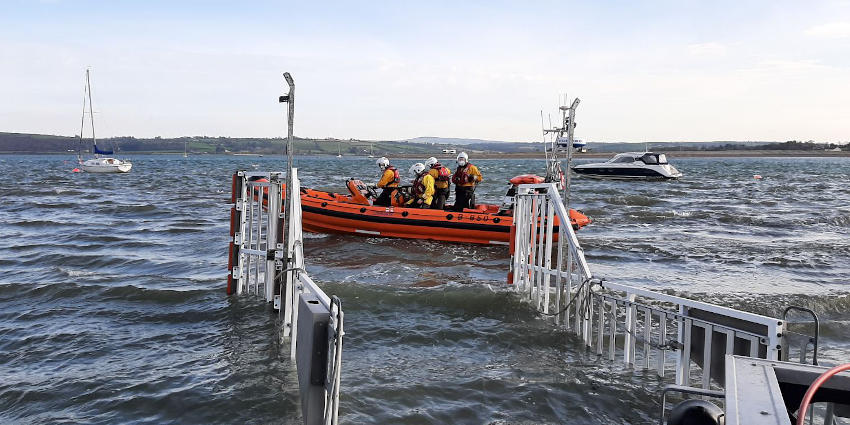 Youghal RNLI’s inshore lifeboat | Photo: Kevin Daly
Youghal RNLI’s inshore lifeboat | Photo: Kevin Daly
Youghal RNLI launched three times the following day, Saturday 19 September.
The first was in the morning, to assist two people on a small boat with engine trouble in Youghal Harbour.
Just after noon, the crew were paged to reports of a person on the rocks at Easter Point. But on scene it was established the person was a kayaker exploring the area and did not need assistance.
Later, the lifeboat launched to reports of a child in the water of Ardmore but was stood down as the crew of the Irish Coast Guard’s Waterford-based helicopter Rescue 117 airlifted the casualty for treatment.
Lifeboat operations manager Derry Walsh thanked the crews for their efforts. “We have responded to four callouts in 24 hours, I think that could be a station record,” he said.
Youghal Lifeboat Launches To Swimmers In Difficulty
Youghal RNLI’s volunteer crew were paged yesterday evening (Tuesday 18 August) to reports of a swimmer in difficulty around half a mile off shore at the East Cork town’s Front Strand.
As they launched the Atlantic 85 inshore lifeboat in calm conditions at 8.23pm, the crew received a further report of a second swimmer entering the water to assist the first and getting into difficulty.
However, both swimmers managed to make it ashore without any assistance from the crew.
The lifeboat made a general search of the area before returning to the station.
“Swimming in open water is very different from swimming in a pool,” said deputy launching authority Mark Nolan.
“Unseen currents, cold water and waves make open water swimming more challenging. Even the strongest of swimmers can tire quickly.
“Remember to always tell someone where and when you are going swimming, and if you see anybody in trouble in the water call 112/999 and ask for the coastguard.”
Youghal Lifeboat Launches To Kayaking Siblings In Difficulty
Youghal RNLI’s volunteer crew were paged Friday evening (14 August) to reports of two kayakers in difficulty — with one thought to be in the water on the northern side of Capel Island.
On arrival, the inshore lifeboat confirmed that one person was in the water and the other was on the rocks of the East Cork island.
The man and the woman were quickly bought on board the lifeboat where the crew made sure both were unharmed before taking them to shore at Knockadoon Pier and the waiting coastguard team. No medical assistance was needed.
Speaking after the callout, deputy launching authority Mark Nolan said: “Kayaking is the most popular watersport in Ireland.
“We would advise people to check the weather and tides before going out, to always wear a buoyancy aid, carry a form of communication with you — and one easy and simple task is to always inform someone on shore of your departure time and estimated time of return.”
Elsewhere this past week, Lough Ree RNLI responded to three callout in two hours on Wednesday (12 August), helping to bring six people to safety.
The first call was just after noon, to assist three people whose motorboat had run aground on the Hexagon Shoal.
Less than an hour later, just as the crew recovered the inshore lifeboat Tara Scougall, they were requested to assist a person whose motorboat had got stuck on the weir boom in Athlone town.
And the final callout at 2.18pm was to two people onboard a boat that was taking on water in Lanesborough.
A woman was evacuated for medical attention by Youghal RNLI yesterday evening (Monday 10 August) after she slipped and fell on rocks below the East Cork harbour’s lighthouse.
The volunteer lifeboat launched at 5.07pm in perfect sea conditions and on a falling tide, reaching the casualty in just three minutes.
Two crew members went ashore with a stretcher to assist the fire brigade and Irish Coast Guard crews who were already at the scene.
Following the Government and RNLI guidelines concerning Covid-19, the casualty was placed onto the stretcher and transferred to the lifeboat.
She was then taken to Youghal lifeboat station where an ambulance was waiting to bring her to Cork University Hospital.
Speaking after the callout, Youghal RNLI’s deputy launching authority Mark Nolan said: “We would like to wish today’s casualty a speedy recovery.
“It can be very easy to fall and slip whilst out walking — be wary of all edges around the sea and water, and always take a means of calling for help with you.”
This year follows one of the busiest for Youghal RNLI in its 180-year history, with a record number of callouts. And 2020 has been especially challenging time for everyone thus far.
As a charity that relies 100% on public donations for its funding, the RNLI have definitely felt the effects of fundraising events being cancelled, bucket collections unable to go ahead and RNLI shops being closed.
If you can make a donation to Youghal RNLI or your local lifeboat at this time, it would be greatly appreciated.
Youghal Lifeboat Launches To Fishing Boat With Engine Trouble
Youghal RNLI’s volunteer crew were paged this morning (Sunday 2 August) at 8.03am to help a one-person fishing boat with engine trouble, six miles south of Capel Island off East Cork.
Operating safely within the RNLI and Government Covid-19 guidelines, the inshore lifeboat crew reached the 16ft fishing boat shortly after launch in good weather conditions.
One member of the crew boarded the fishing boat and, after making sure that the person on board was fine, a tow was established to bring the vessel back to Ferrypoint.
Speaking after the callout, deputy launching authority Mark Nolan said: “Engine trouble is one of the main reasons for RNLI callouts. Problems can occur at any time; being prepared is key.
“Always carry a form of communication with you, just like the person on-board today; once he realised there was a problem, he was able to call for help straight away, avoiding any unnecessary danger.”
Youghal RNLI’s inshore lifeboat and her volunteer crew responded to their pagers yesterday (Sunday 14 June) when the alarm was raised by two people aboard a fishing vessel with steering failure.
Helmed by Liam Keogh, The lifeboat launched just before 1pm to the 20ft fishing vessel, 2km south east of Youghal Harbour near the Black Ball buoy, in fairly calm sea conditions.
Once the fishing boat was located, one crew member boarded, following all Covid-19 guidelines and procedures, and worked to quickly establish a tow.
The fishing vessel was then safely towed back to its mooring in Ferrypoint and the lifeboat returned to the station by 1.40pm.
Speaking after the callout, Lou Stepney, Youghal RNLI’s volunteer press officer, said: “Mechanical failure is one of the main reasons for RNLI callouts.
“Situations can change very quickly at sea. We advise anyone out on the water to be prepared for an emergency by always wearing a lifejacket, checking your equipment before you set off and always to carry a means of calling for help, call 112/999 and ask for the coastguard.”
Youghal Lifeboat Tasked In Search For Missing Person
Youghal RNLI’s volunteer crew were part of a multi-agency operation yesterday evening (Sunday 24 May) to reports of a missing person in Youghal.
The inshore lifeboat launched in good weather on a filling tide at 6.04pm a few minutes after pagers sounded.
Working alongside the Irish Coast Guard and its Rescue 117 helicopter from Waterford, a comprehensive search was undertaken from the inner harbour at Youghal to Knockadoon.
But the lifeboat crew were pleased to stand down at 7.30pm after the reported person was found safe on shore.
Speaking following the callout, Youghal RNLI lifeboat operations manager Derry Walsh said: “We welcome the news that the individual was found safe and well.
“We would like to remind the public that although our volunteers are currently not taking part in weekly training exercises due to the Covid-19 pandemic, we remain on call and available 24/7.
“If in need of help please call 112/999 and ask for the coastguard.”
The Youghal lifeboat crew on this callout were Martin Morris, Mike Brooks, Jack Nolan and Karen Walsh.
Youghal RNLI Assist Fishing Boat Aground at Ferry Point in Stormy Conditions
The volunteer crew of Youghal RNLI were paged yesterday at 4.57 pm to reports of a fishing vessel with one person onboard aground on the rocks at the northern end of Ferry Point.
Launching in force 8 North Westerly winds and choppy conditions, the inshore lifeboat arrived on the scene a few minutes later to find the fisherman had managed to get safely onto land.
The crew established a tow line and brought the fishing boat off the rocks and alongside the lifeboat. One crew member then boarded the vessel and began to pump out water as it was towed safely back to Harvey’s dock and handed over to the awaiting Coast Guard unit.
The Lifeboat returned to the station at 5.41 pm. The Lifeboat crew were, Patsy O’Mahoney (Helm), James Hanna, Liam Keogh and Jack Nolan.
Patsy O’Mahoney, Youghal RNLI Helm said: ‘Situations can change very quickly at sea, especially in stormy conditions. Our training really stood to us today dealing with the swell and high winds’.
Retiring Youghal RNLI Volunteer Recognised For 30 Years Of Service
The volunteers of Youghal RNLI recently gathered at Berties bar in the East Cork town to mark the retirement of long-serving crew member John Innes.
John first became involved in 1987 and was fully enrolled as a crew member by 1988. He went on to become a helm on three Atlantic class lifeboats: the Atlantic 21 Marjory Turner, Atlantic 75 Patricia Jennings and the current Atlantic 85 Gordon and Phil.
He also served as lifeboat training co-ordinator between 2001-2009 and again between 2016-2017.
Speaking on the night, John said: “Since I started with the RNLI 30 years ago, I’ve seen many changes and big improvements, the standard of training is so high these days.”
There have been many memorable rescues for John over the years. One he remembers from his early days happened one summer evening, when a man from Cork city traveled to Youghal to try out his new surfboard that he’d received as a birthday gift.
John recalls: “The man had booked a surfing lesson, but the teacher was late so he decided to go out on his own. Shortly after he entered the water, he began to be swept out to sea with the offshore breeze.
“When we arrived the man was in the water and being carried further out to sea, he was freezing cold. Had we not arrived when we did, the outcome could have been very different.”
During his 30 years with Youghal RNLI, John Innes was instrumental in saving 34 lives at sea.
Deputy launching authority Brendan O’Driscoll said: “The time, effort and commitment John has shown to Youghal RNLI over the last 30 years has been outstanding.
“On behalf of everybody at the lifeboat station, I would like to thank him for the immense contribution he has made over the years and we all wish him well in his future endeavours.”
Youghal Lifeboat Called To Vessel Sinking In Harbour
A boat sinking on its moorings at Youghal Harbour in East Cork prompted a callout for the local RNLI volunteers yesterday afternoon (Friday 20 September).
Only the bow of the 24ft boat was visible when the lifeboat crew arrived. A towline was set up and the vessel was brought as close to the pier as possible on the falling tide.
With assistance from the local coastguard unit, the boat was secured with two rides for the owner to attend too at low tide, Youghal RNLI reports.


























